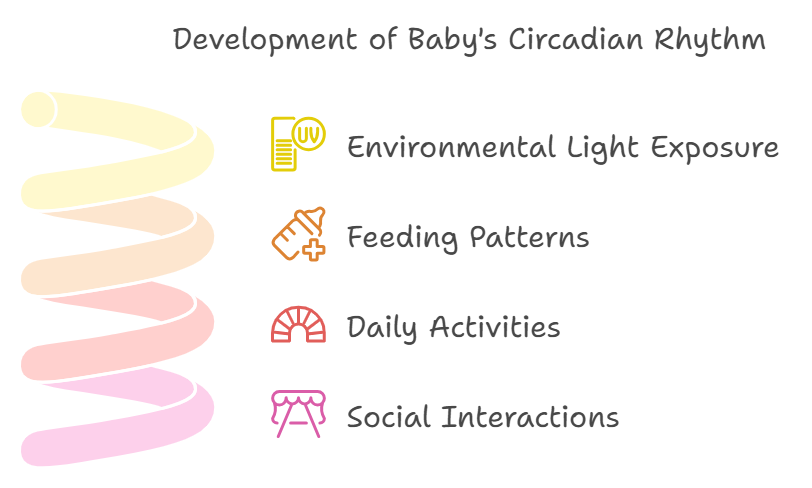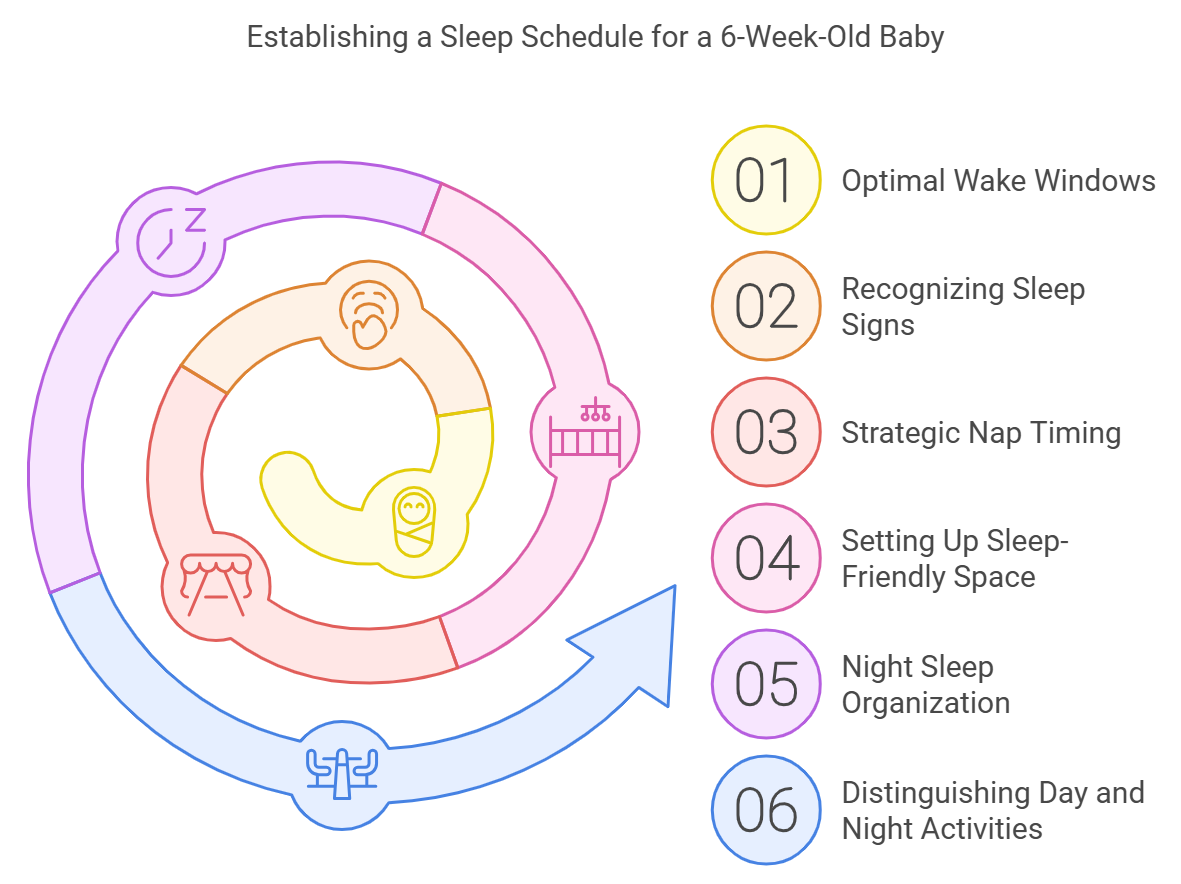Why a Consistent Sleep Schedule Matters for 6-Week-Olds
Sleep can be challenging when your 6-week-old baby (sleep schedule 6 weeks) follows unpredictable patterns. You might feel drained and overwhelmed. Some babies develop natural rhythms, but most need help with a structured sleep routine at this stage.
Your baby’s sleep schedule depends on their wake windows and age-appropriate nap timing. A newborn at six weeks usually needs 4-5 naps throughout the day. Their natural sleep-wake cycles guide this pattern.
This detailed guide shows why consistent sleep matters at this age. You’ll find practical steps to create a routine that works for you and your baby. The guide will help you spot your baby’s sleep signals, plan better nap times and build a schedule that supports their growth.
Understanding Your 6-Week-Old’s Sleep Biology
Your 6-week-old baby has fascinating and complex sleep biology. Learning about their sleep patterns will help you direct this challenging period more confidently.
Brain development and sleep cycles
Your 6-week-old spends about 50% of their sleep time in REM (Rapid Eye Movement) sleep. This high amount of REM sleep is vital for brain development. Your newborn’s sleep cycles differ substantially from adult patterns. Adults sleep in long, uninterrupted blocks, while your baby needs up to 18 hours of sleep split into several short periods throughout each 24-hour cycle.
Sleep Cycle Breakdown:
- Active (REM) Sleep: Light sleep with visible movement
- Quiet Sleep: Deeper sleep phase
- Total Cycle Length: 45 minutes
Circadian rhythm development
Babies aren’t born with a complete circadian rhythm. This internal clock starts developing in the womb and evolves after birth. Sleep distributes evenly between day and night at 6 weeks. Most babies resolve this day/night confusion around 8 weeks.
Your baby’s circadian system develops through:
- Environmental light exposure
- Feeding patterns
- Daily activities
- Social interactions

Sleep hormone regulation
Melatonin, known as the “darkness hormone,” plays a vital role in your baby’s sleep regulation. Your little one starts producing their own melatonin at 6 weeks, though in small amounts. Production typically begins between 1-2 months and increases gradually.
Breast milk helps regulate your baby’s sleep-wake cycle. Evening breast milk contains natural melatonin, while daytime milk has cortisol (the awakening hormone). These natural variations support your baby’s developing circadian rhythm.
Your baby can stay awake for 30-90 minutes before needing sleep at this stage. This “wake window” helps you time naps appropriately. These biological sleep cues let you work with your baby’s natural rhythms.
Your 6-week-old’s irregular sleep patterns are completely normal. Their sleep-wake system matures closer to 3-4 months of age. Natural light during the day and darkness at night create a consistent environment that supports their developing circadian rhythm.
The Science Behind Sleep Schedule Consistency
The science behind consistent sleep schedules shows why they matter so much to your 6-week-old’s development. New research has found amazing links between how babies sleep and how they grow.
Impact on cognitive development
Your baby’s brain development connects directly to their sleep patterns. Their brain works hard during sleep to process everything they learned while awake. Babies who sleep at regular times show better memory and thinking skills. Your baby’s brain roughly doubles in size in their first year, and most of this growth happens while they sleep.
Research shows babies with regular sleep patterns have:
- Better memory
- Stronger language skills
- Quick learning abilities
- Sharp cognitive skills
Effects on physical growth
Sleep and physical growth share a strong connection at 6 weeks. 80% of growth hormone releases happen in deep sleep. This hormone, somatotropin, helps your baby develop properly.
Research shows clear links between sleep and growth:
- Most babies double their birth weight by 5 months
- Growth spurts link directly to longer sleep times
- Kids who sleep less than 12 hours daily risk becoming overweight in pre-school
Stress hormone regulation
Sleep quality affects your baby’s stress hormone levels. Babies who sleep through the night show lower morning cortisol than those who wake up often. This matters because:
Cortisol Impact on Development:
- High cortisol can limit learning
- Stress hormones change emotional control
- Broken sleep raises cortisol levels
Good sleep and hormone balance work together. Better sleep helps control hormones, which then helps babies sleep better. Babies who follow regular sleep schedules tend to have more balanced cortisol throughout the day.
Regular sleep helps your 6-week-old’s growing immune system too. Their body makes disease-fighting cells and antibodies during sleep. Lack of sleep can make your baby more likely to get sick, especially if they were born early.
These biological processes show why regular sleep matters to your 6-week-old’s development. Setting up a routine takes time, but science proves that consistent sleep helps every part of your baby’s growth.
Key Components of a Consistent Sleep Schedule
Your 6-week-old baby needs a consistent sleep schedule based on three elements that work together to build healthy sleep patterns.
Optimal wake windows
A 6-week-old baby stays awake comfortably for 45-60 minutes between sleep periods. This wake window plays a vital role to prevent overtiredness that makes it harder for babies to fall asleep. Your baby will show these sleep signs when ready to rest:
- Eye or ear rubbing
- Turning away from stimulation
- More fussy behavior
- Yawning
- Starting to get cranky
Strategic nap timing
Your 6-week-old needs several naps throughout the day. Most babies at this age take 4-7 naps daily. These naps should start between 6-8 AM and spread throughout the day. Each nap typically lasts 45-60 minutes, though some might stretch to 2-3 hours.
Your baby will nap better when you:
- Set up a sleep-friendly space (68-72°F)
- Look for drowsy signs early
- Use shorter versions of bedtime routine
- Keep nap spots consistent
Night sleep organization
A well-organized night sleep helps set your baby’s internal clock. Your 6-week-old isn’t ready for strict sleep training yet, but you can start a regular bedtime routine around 10 PM.
Your night sleep checklist:
- Room temperature should stay between 68-72 degrees Fahrenheit
- Plan for feedings every 2-4 hours through the night
- Keep night feedings calm and quiet
- Make day and night activities distinctly different
Note that babies this age sleep in short stretches (30 minutes to 3 hours) between feeds. Bottle-fed babies might sleep longer between feedings (3-4 hours) than breastfed babies who need feeding every 2-3 hours.
These sleep schedule elements help your baby develop good sleep habits when you follow them regularly. While these guidelines work well, your baby might need shorter wake times or extra naps some days, especially during growth spurts or developmental changes.
Signs Your Baby is Ready for Schedule Structure
Getting your little one into a sleep routine can feel like putting together a complex puzzle. Each baby grows at their own pace, but your 6-week-old might show signs they’re ready for a gentle schedule.
Developmental readiness indicators
Your baby starts showing signs they can handle a routine at 6 weeks. Their wake windows typically range from 30-90 minutes, giving you a natural framework to plan naps and bedtime. Your baby’s internal clock matures gradually, and it’s worth mentioning that you won’t see a fully predictable schedule until around 3-4 months.
Key developmental markers include:
- More consistent feeding patterns
- Longer periods of alertness during the day
- Better day/night awareness
- Clear tired signals
Behavioral cues to watch for
Your baby shows they need sleep through different signals. You’ll have an easier time setting a schedule if you spot these signs early, which helps prevent overtiredness.
Early sleep signals include:
- Less activity
- Reduced alertness
- Eye rubbing
- Yawning
- Looking away from you
- Lost interest in surroundings
Important: Your baby might get cranky or suddenly energetic if you miss their original sleep window. This “second wind” makes it harder for them to settle down and sleep well.
Common schedule obstacles
You can guide your baby toward better sleep patterns by understanding possible challenges. Here are the most common hurdles you might face:
- Day/Night Confusion
- Most babies outgrow this by 8 weeks
- Bright, active days and quiet, dark nights help
- Keep nighttime feedings calm and dark
- Inconsistent Wake Times
- Sleep pressure and hunger drive your baby’s schedule at this age
- Watch wake windows instead of clock times
- Your baby will likely split sleep evenly between day and night
- Schedule Resistance
Some babies need time to adapt to routines, which is perfectly fine. Your 6-week-old isn’t ready for strict sleep training yet. Start with a consistent environment and respond to their cues while you build more predictable patterns.
Pro Tip: Track your baby’s sleep to spot natural patterns. This helps you work with their body clock instead of fighting it. Some babies thrive on strict routines, while others need more flexibility.
A sleep schedule at 6 weeks focuses more on spotting patterns and creating gentle routines than strict timetables. Your baby will naturally develop better sleep patterns if you consistently respond to their sleep cues and respect their wake windows.
Health Benefits of Schedule Consistency
A consistent sleep schedule does more than create predictability for your 6-week-old – it supports their physical health and development in fundamental ways. Research shows that sleep plays a vital role in child development and affects multiple body systems.
Impact on immune system development
Your baby’s immune system depends on quality sleep. Their body produces special proteins called cytokines that fight infections and illnesses during rest periods. The way these protective proteins work is the sort of thing I love – when your baby gets sick, their immune system makes more cytokines, which then promote more sleep to help recovery.
Key immune benefits of consistent sleep:
- Better production of infection-fighting proteins
- Faster recovery from illness
- More robust immune response
- Natural regulation of inflammation
Studies show that sleep issues affect much of children under age 3, which might affect their immune function. This makes a regular sleep schedule vital during these early months.
Digestive system regulation
Your baby’s sleep patterns link closely to their digestive comfort. Newborns start life with no gut bacteria and their digestive system develops gradually. A regular sleep schedule helps create consistent feeding patterns, which leads to:
- Smoother digestion between feeds
- Less gas and discomfort
- Better nutrient absorption
- Regular bowel movements
The quickest way to digestive comfort is to space feeds 3-4 hours apart during the day while letting your baby lead nighttime feeding. This helps their gut empty properly between meals and supports natural digestive rhythm.
Temperature regulation benefits
Your baby’s sleep quality depends heavily on temperature regulation. Research shows that sleep and temperature regulation connect fundamentally, as body temperature changes signal sleep readiness. At the time your baby is 6 weeks old, they’re still learning to regulate their temperature, which makes room temperature control vital.
Temperature considerations for optimal sleep:
- Keep room temperature at 68-72°F for best sleep
- Set up the crib away from windows and heating/cooling vents
- Look for signs of temperature discomfort
- Change clothing layers based on room warmth
Studies show that the right room temperature and bedding help humans fall asleep faster. This matters even more for babies who are still developing their temperature control.
Regular sleep timing helps your baby’s natural temperature rhythm. The body’s core temperature naturally drops as bedtime approaches, with the biggest drop happening right at sleep time. A consistent schedule helps your baby’s body prepare for these temperature changes.
Note that premature babies need extra care with temperature, and their room might need to be slightly warmer. Watch carefully for signs of overheating. Regular sleep patterns help steady these temperature changes, which leads to better sleep and overall health.
Tracking and Adjusting Sleep Patterns
Technology has changed how parents track their baby’s sleep patterns and helps them create better routines. Studies show that sleep apps and trackers have become vital tools for parents who want to understand their baby’s sleep patterns better.
Methods for monitoring sleep
Parents now have access to sleep tracking methods of all types. Each method helps them understand their 6-week-old’s sleep patterns. The 2022 review in the Journal of Pediatric Health Care confirms that baby sleep trackers can spot sleep patterns and guide parents to better sleep habits.
Popular tracking options include:
- Digital sleep logs through apps like Huckleberry
- Smart wearables such as the Owlet Smart Sock
- Video monitoring systems like the Nanit Pro Camera
- Traditional paper sleep diaries
- Observation of sleep cues and patterns
Studies show that the JOHNSON’S BEDTIME Baby Sleep app showed real-life effectiveness. Babies went to bed earlier and slept longer without waking up.
Identifying improvement markers
Your 6-week-old’s sleep follows specific patterns that show progress. Wake windows last between 30-90 minutes at this age. Look for these positive changes that show your tracking works:
Key Progress Indicators:
- More predictable sleep onset times
- Longer continuous sleep periods
- Fewer night wakings
- Better response to sleep routines
- Better day/night patterns
Note that sleep changes faster during the first few years. Your baby’s total sleep time drops from 16-17 hours as a newborn to 14-15 hours at 16 weeks old.
When to adjust the schedule
The right time to change your baby’s sleep schedule plays a vital role in healthy sleep patterns. Changes in your baby’s sleep might mean you need to adjust their schedule.
Signs it’s time to adjust the schedule:
- Changes in feeding patterns
- More fussiness during usual sleep times
- Problems falling asleep at regular times
- Wake windows that differ from usual
- Development milestones affecting sleep
The Huckleberry app can spot when you need to make changes. It analyzes your baby’s sleep patterns and suggests ideal nap times and bedtimes. This analytical approach works best with your parental instinct to optimize the schedule.
Keep in mind that tracking tools should add to your observations of your baby’s unique cues and needs. Helping your baby get enough sleep and building good sleep habits matter most during the newborn phase.
Watch for these early sleepy cues to prevent overtiredness:
- Staring off into the distance
- Calm and peaceful demeanor
- Subtle yawning
- Reddish hue on eyebrows and eyelids
These “first alert” signs differ from tired cues that show your baby is becoming overtired. Consistent tracking of these signals lets you adjust your baby’s schedule before problems arise.
The National Sleep Foundation suggests 14-17 hours of daily sleep from birth to 3 months. Many infants sleep less than recommended, especially in predominantly Asian countries. This explains why you should personalize sleep schedules based on your baby’s needs while maintaining healthy sleep boundaries.
Sleep tracking methods work best when you don’t rely too much on technology. Apps and trackers offer great benefits, but research suggests using them carefully. They might cause too much monitoring and make parents anxious.
Conclusion (Sleep Schedule 6 weeks)
A consistent sleep schedule shapes your 6-week-old baby’s development and impacts their immune function and cognitive growth. Setting up these schedules can feel overwhelming at first, but you’ll find it easier once you understand your baby’s natural rhythms.
You can build healthy sleep habits by tracking patterns, spotting developmental signs, and responding to your baby’s cues. Babies develop at their own pace, and what helps one baby might not work for another. Small steps toward progress matter more than achieving perfection.
Research proves that regular sleep schedules improve brain development and strengthen the immune system. Your baby will develop better sleep patterns throughout their first year when you establish regular wake windows and learn their sleep cues. These early steps create lasting benefits that extend well beyond the first year.
FAQs
Q: Is it necessary for a 6-week-old to follow a sleep schedule?
A: At 6 weeks old, establishing a fixed sleep schedule may not be feasible due to the ongoing development of the baby’s circadian rhythm and the influence of sleep pressure and hunger.
Q: Why should babies adhere to a sleep schedule?
A: Implementing a sleep schedule helps in developing a baby’s circadian rhythm, enhances sleep quality, and provides comfort and calm. This routine is crucial for the baby’s health and developmental progress, aiding in more consistent sleep through the night.
Q: What are the advantages of maintaining a consistent sleep schedule?
A: Consistent sleep schedules are essential for overall health as they help reduce the likelihood of illness, maintain a healthy weight, lower the risk of severe health issues like diabetes and heart disease, and enhance mood and cognitive functions.
Q: Is it beneficial for a 6-week-old to have a bedtime routine?
A: Introducing a bedtime routine at six weeks old can be beneficial, even though the baby may not adhere to a strict schedule. A routine can foster a sense of consistency and predictability, which can be comforting for the baby.










